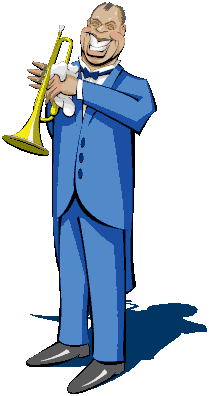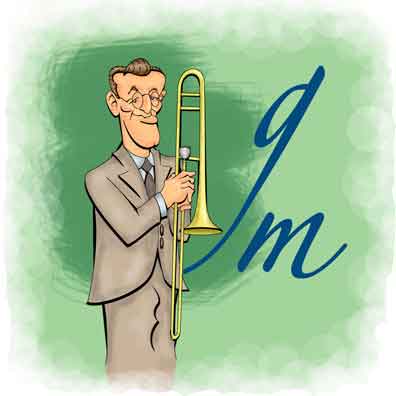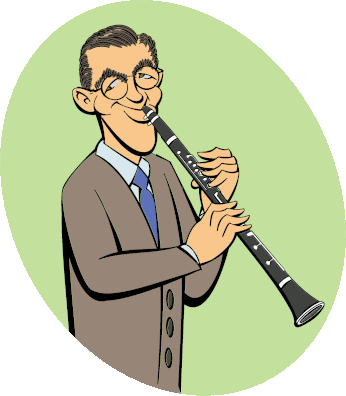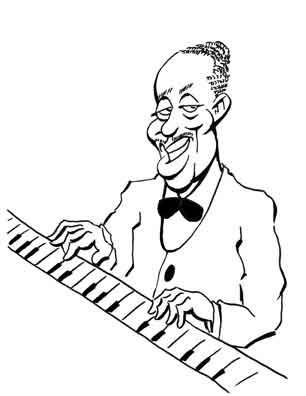King Oliver
and Friend
(Click on Image to Zoom In and Out)
Exactly when Joseph Nathan Oliver was born is hard to pin down. Some sources - like his draft card - say it was in 1881. But others, including some nice chaps in Oxford, put it at 1885. Exactly where is also problematical. Some say Joe was born in Aben, Louisiana, a small town about 50 miles west and a bit north of New Orleans. Others say it was in New Orleans itself.
What isn't disputed is that music was (and still is) a major part of the African American culture. But when Joe was born if you wanted music it had to be live music. And if you wanted live music and on demand, you pretty much had to make it yourself.
Exactly when Joe began to play the trumpet - actually cornet - is (of course) a bit uncertain. Some say it was relatively late and after the turn of the Millennium. If so he was in his late teens or even his early twenties. Yet others say he learned to play as a kid in a band organized by a local musician named Walter Kinchin.
But whenever Joe first began to play, New Orleans was the place to be. Brass instruments, left over from the Civil War, proliferated. New Orleans had been occupied by the Union Army early in the war, and the occupying military regiments, like those of the Confederate Army, had their own bands. Because the troops lived largely outdoors and in all kinds of weather, in addition to the field drums that kept the beat, the regimental musicians usually stuck with the rugged brass instruments who didn't mind if it was raining.
So when the troops finally pulled out in 1877, the leftover instruments ended up being passed down to friends and family and as well as showing up in the increasing number of pawnshops. New Orleans was also a city where various clubs and organizations flourished. They all had their own bands and in the neighborhoods and parishes concerts and parades became a major part of New Orleans life, and although reed instruments like the clarinet were quickly added, the brass players were the stars. And the trumpet players were the real stars.
As to what the bands played, most of it was popular tunes. The compositions of Stephen Foster - "Way Down Upon the Swanee River", "Camptown Races" - were ubiquitous1 but you also had excerpts from popular operettas, songs such as Gilbert and Sullivan's "I'm Called Little Buttercup" and "A Policemen's Lot is Not a Happy One". Of course religious songs and hymns like "Onward, Christian Soldiers" and "What a Friend We Have in Jesus" were de rigueur, and there were the old chestnuts like "Golden Slippers", "Grandfather's Clock", and "(Casey Would Waltz With the) Strawberry Blonde (And the Band Played On)".
Footnote
Stephen Foster was arguably the most popular American composer of the early 19th century and his songs led to one of the most popular entertainments of the time, the minstrel shows. These shows featured music, dancing, and comedy routines often performed by white actors and musicians in blackface makeup.
Seen today as horrible insulting and racist, the minstrel performances remained common until the end of the 19th century. Although the rise of vaudeville ended the era, satirical minstrel skits where even civic leaders performed in blackface could be seen in the more quaint towns well past the mid-20th century.
But in the South there were songs that had been sung by the slaves on the plantations. It was out of this music that emerged new genres. Other songs were slow and mournful set to twelve bars and with new chords where a flattened 7th note of the scale was added. Sometimes the notes were "bent" by making a brief glissando. This music was called the blues.
Then there were quicker tunes with an emphasis on the off-beat. Originally played on the piano, these snappy compositions borrowed chords from the blues and soon were taken up by the brass bands to produce an entirely new music indigenous to New Orleans.
Even if Joe first played in Walter's kids band, he soon learned a lot of this new music from one of New Orlean's top trumpet men, Willie "Bunk" Johnson even though Willie was likely a few years younger than Joe. A lot of people still called the new music ragtime or the blues. But in a few years and inexplicably it was labeled jass or with increasing frequency by a name less amendable to rude puns, jazz.
As he got older Joe played in a number of bands, often switching groups from night to night. He was soon ranked with the best of the brass. The story is he picked up the nickname "King" after he defeated two other trumpet virtuosi in a contest.
Like most jazz musicians, King would also march in the parades. He soon noticed a young man hanging around who kept offering to hold his instrument case. Introducing himself as Louis Armstrong (although his friends called him Dippermouth), he said that he, too, played the cornet. Young Louis would also talk to King's wife, Stella, and Stella thought Louis was a nice kid.
When King finally heard Louis play, he recognized his ability. He'd let his young protégé sit in and sometimes would recommend him to other band leaders who needed a horn man.
In New Orleans, the first two decades of the Twentieth Century were good times for musicians. If you were good, that is. You could pick up a dollar a night - maybe a dollar and a quarter - particularly in the famed Storyville district between modern day Basin and Canal Streets.
Or we should say the infamous Storyville district. You see, Storyville was known for its sporting life - and we don't mean there were shops where you could buy baseball gloves, running shoes, or golf clubs. Instead there were the honky-tonks - bars and saloons where there was live music - as well as establishments directed toward gentlemen's special interests - where there was also live music while you wait.
The goings-on in Storyville were quite legal and the district had been zoned as a way to keep the wild life from the more genteel parts of town. Business was booming and all seemed well for King and his fellow jazzists.
But toward the end of 1917 Storyville - along with its music - suddenly vanished.
You see, after America joined in the War That Didn't End All Wars, New Orleans had become a port of embarkment and disembarkment for the troopships going Over There. The top military, many of whom supported traditional family values, were aghast to see the troop trains pull up to the stations where they could look at the balconies and windows and see the young ladies displaying their charms - and we mean displaying their charms. Finally with some reluctance but with the considerable pressure from the Federal Government, the city shut down the entire Storyville district in a single night. So the businesses had to close up or go elsewhere and operate incognito.
Although a lot of musicians found themselves scratching for the few remaining jobs, King was not affected by the closing of Storyville. In 1916 he had hooked up with trombonist Ed "Kid" Ory who also sometimes performed with a cantankerous soprano saxophonist named Sidney Bechet.2 Kid and King formed a band where they were co-leaders. Commonsensically it was dubbed the Kid Ory and King Oliver Band, and soon they became one of the most popular groups in New Orleans.
The band of Kid and King steered away from Storyville. Instead, they played for respectable audiences at the best ballrooms and hotels. They even performed at dances for the kids of the New Orleans's uppercrust that were held at Tulane University.
Unfortunately, jazz still seemed to have been held in questionable standing amongst the gentry. In 1917, King was playing at the Winter Garden which was a high class spot on Gravier Street. All was going well when the cops showed up and raided the place. Officially the complaint was disturbing the peace and King was tossed in jail.
Although he was soon out - probably with just a small fine - the incident soured King on New Orleans. Why would the authorities hassle law abiding citizens for playing a music that was becoming popular with everyone? King began to look for more congenial surroundings.
After the War, the country had started to move - literally. Jobs began to open up in the factories in the North and many of them hired anyone who would do the work. More and more African Americans began leaving the South and new centers of the black diaspora were opening up in the Midwest: St. Louis, Kansas City and the city that Carl Sandburg had dubbed the City of the Big Shoulders. That is, Chicago.
Chicago quickly became the new center of jazz - and the center of a new jazz. The music put more emphasis on letting the individual musician step up and solo while the rest of the band played in the background. Part of the music's success was from the number of the young fans - black and white - that were popping up everywhere. Many picked up the instruments themselves and began playing the music which became known as (what else?) Chicago jazz.3
Footnote
True Dixieland jazz had the players playing their parts together and extended virtuoso solos were rare. Nowadays players swapping solos are typical and much of what is called Dixieland is actually Chicago style.
In Chicago, King first joined the band of bass man, Bill Johnson, and in 1921 he briefly moved to California to play with Kid Ory. But King wasn't going to play second fiddle to anyone. So in 1922 he was back in Chicago and formed his own band, King Oliver's Creole Jazz Band.
Thinking a second trumpet player would be useful, King wired Louis Armstrong to come up and join them. Louis, who had found work playing trumpet on the Mississippi riverboats, jumped on a train and found that King had already set up him with a room in a boarding house. Louis was flabbergasted to find he even had a bathroom. That was real luxury.
The band had seven members. In addition to King and Louis on cornets, the band featured Honoré Dutrey (trombone), Baby Dodds (drums), Bill Johnson (now playing tenor banjo), and Johnny Doss (clarinet). King also hired a young lady named Lil Hardin to play piano and she soon became better known as Lil Armstrong

Louis Armstrong
Playing Chicago Jazz
King began experimenting with different sounds. He particularly liked the effects of the mutes, a venerable accessory inserted into the bell of the trumpet or trombone to soften the sound and alter the timbre (but not the pitch). He particularly liked the plunger mute - even today simply a plumber's rubber plunger - as well as the wa-wa mute known for its ability to produce a laughing sound.
It didn't take long for the Creole Jazz Band to hit the recording studios. Their first release was in 1923 on Okeh. Okeh was famous for country music - then called "hillbilly" - and recordings of African Americans - termed "race" records. King's early recordings were acoustic and are of lower quality compared to the sound from the electric technology that came along in 1925. Over the years King released over 150 records either as a performer, band leader, or composer.
One problem with playing in the one city is that the audiences can tire of the same faces and the same sound. So eventually the club owners turn to new entertainers. This is good for the owners and the audience, but not that great for the bands.
Now one way for a band to avoid oversaturating the market (as they say now) is to go on tour. That way the fans will get tired of someone else and clamor for you to return. So in 1924, King and the band headed out.
The band moved through the northern states, Ohio, Wisconsin, Michigan, and on to Pennsylvania where they played in Harrisburg (the state capital) and in rural Lancaster. Naturally they ended up in New York where they got good reviews and King was called the "hottest" jazz musician in the business.
After the tour, though, King's Creole Jazz Band fell apart. Not, mind you, through major discord (no joke intended). It was just that a lot of the band members felt it was time to go their separate ways. And that included Louis Armstrong.
We have to admit it. Louis was the better player. In particular he played with a big sound that really stood out.
But as long as he stuck with King, Louis knew that even if he tried harder he'd always be #2. So with the full approbation of Lil, Louis took the job as the principal trumpet for Fletcher Henderson. But soon he formed his own band, Louis Armstrong's Hot Five, which (we must point out) included not just Lil, but a good chunk of the rest of King's old band.
With Louis snitching his personnel, King needed new musicians. With his reputation, this was no problem and he quickly pulled together a new group called the Dixie Syncopators, and they became the house band at Chicago's swank Plantation Cafe. This was in the black section of town but catered largely to white audiences although this willingness to mix the races in terms of near equality was fast waning.
King - or rather the cafe owners - were running into other problems. Remember this was Chicago during Prohibition. Although the simple telling is that one man - Al Capone - was in charge of the city's nefarious doings, the truth was there were a number of gangs in the city and they tended to not get along.
With the city divvied up into different mob "territories", the night clubs necessarily found themselves controlled by one gang or another. And when one gang got irritated at another they tended to do unpleasant things.
Among the impoliteness was throwing bombs through the windows of their rivals' establishments or driving by and raking the frontage with machine gun fire. The Plantation Cafe was subject to at least one bombing and that incident, plus the never ending police raids, ended up closing the place down by 1927.
Chicago was getting too hot for King's comfort. So he and the band decided to try New York which had been quite congenial during his earlier tour. Although King was short on cash and had to recruit new members to replace those who didn't want to relocate, he managed to get an extended booking at the Savoy Ballroom which was second only to the Cotton Club in musical prestige.
Although King had now relocated to the center of the Harlem Renaissance, he was soon plagued by bad luck and bad decisions even though the decisions often originated from high motives. Refusing to play for anything less than what he thought he and the band was worth, he kept turning down jobs that others leapt at. He even refused an offer for an extended engagement at the Cotton Club. Instead the job went to a young fellow named Duke Ellington who we know did quite well.
With no clubs wanting to book him, at least not at his price, there wasn't much else for King to do but once more go on tour. In June 1930, he arranged a three week engagement at the El Torreon Ballroom in Kansas City. This was a big job. So the tour was off to a good start.
But King was a proud man with his own ideas of what his music should be, and he sometimes found himself at odds with the clubs' managers who wanted him to stick with his most famous tunes. Unfortunately he sometimes had to find local men to fill in the spots and they might not know the songs. Not concerned with King's staffing difficulties, the club owners began murmuring that King was "difficult" and playing dates became harder to come by - which is a problem when you're in the middle of a tour.
Still the band managed - for a while. They ranged from Galveston, Texas up to King's old stomping grounds of Chicago. But the finances became increasingly precarious. Often they couldn't pay for decent meals, and once the group's drums were seized as collateral until King could square the hotel bill. Problems were exacerbated since King would still turn down offers if he thought the money was too low. By summer's end, they were back in New York with little profit to show.
Let's face it. In New York competition is tough and it got worse. With the end of the Roaring Twenties and the onset of the Terrible Thirties with its Great Depression, a new sound was emerging. That was Swing or Big Band Music. The small jazz bands couldn't attract the audiences that Benny Goodman and Glenn Miller could.
With big bands the rage, King followed suit as well as he could. He expanded his group to as many as ten players. Naturally this drove up the expenses and he became even more strapped for cash.
A common story is that on his last tour the bus broke down and the band split up. And reading the various short bios of King you might think that for the last few years of his life he was living destitute and working as a janitor or selling vegetables on the street. The truth is King was leading his band almost until the end of his life and the buses broke down and the band split up with regularity.
But he was finding it harder to find bookings in New York, and so he went to a new agent to arrange another tour. Pulling together a new group - King Oliver and the Harlem Syncopators - he headed off at the end of March 1931.
For the next six years, King was almost always on the road. Changes in the personnel remained high and finances were always teetering at the edge. King sometimes had to write friends for loans, and if the men made $4 for a performance that was opulence. Instead, the money often went to pay for transportation and lodging with nothing left over.
Turnover got to be so high that sometimes King would have bookings but no band. He was always having to find new players and at one point it seems that Lil Armstrong joined the tour for a while as a favor to her old friend. Even when King had a band they might end up stranded in a town until they could pay their bills. In winter they could get snowbound and miss jobs.
With all the uncertainty, the players became increasingly edgy and sometimes frustrations erupted into fisticuffs. Not only did the buses keep breaking down but accidents were uncomfortably frequent. Once they almost went down a mountain side and everyone had to scramble out from their precarious position. Just after Christmas in 1934, the driver - who hadn't been able to get enough rest - dozed off at the wheel and they were fortunate to avoid any injuries.
King's rivals included ...

Glenn Miller...

... Benny Goodman ...

... and Duke Ellington
There were other problems that were particular to a country that only ended slavery after what one politician called "a great Civil War". When they arrived at a small town in Texas they were not allowed to get off the bus since the people there said they only danced to white orchestras. They were ordered out of the city and were followed by a group of cars to ensure they complied.
In fairness, though, this episode didn't seem typical since they appeared in other Texas towns before moving on to other venues such as Shawnee, Oklahoma, and El Dorado, Kansas. In Tulsa they even had the luxury of playing in a large ballroom which boasted the new fangled luxury of air conditioning.
King's lifestyle had never been the healthiest. Although when not on tour, he preferred the company of his wife Stella and his stepdaughter rather than spend a riotous night out with the boys, he was quite the gourmand. He'd could pack away half a dozen hamburgers or a whole chicken at one sitting and this repast would be followed by an entire pie for dessert. On tour he sometimes demanded the biggest portions and not unexpectedly his weight went up and with it his blood pressure.
King really had a sweet tooth and one of his favorite foods was sugar sandwiches. Although you don't hear much about sugar sandwiches these days, they were quite popular in the early Twentieth Century. Also as a man whose job kept him moving about, he couldn't brush after every meal.
So its no surprise that as the years rolled on King's teeth began giving him problems. He developed gingivitis which worsened to periodontitis, and it became painful to play the trumpet. By the end of 1935 King had lost all of his teeth and had abandoned playing altogether.
But he could still lead the band, and King Oliver remained a big name. His performances still got good reviews.
King had found that his tours in the South had been the most lucrative. So in 1937 he set up his headquarters in Savannah, Georgia. Savannah, although, not particularly large for a city, was quite cosmopolitain with access to the booking agencies. However, he found actually landing jobs increasingly difficult and evidently the word was getting around that touring with King Oliver was no slice of pie. One of the residents remembered that so few musicians were willing to join him that King tried to form a band by recruiting some neighborhood kids. Of course this experiment fell flat and King wrote his sister that he was out of work
So the summer of 1937 found King scraping along by - yes - running a fruit and vegetable stand. As winter moved in and the local produce became scarce, he began working as a janitor. He found lodgings in a nearby boarding house, and it was in his room on April 10, 1938, at age 52 that King Oliver died of a cerebral hemorrhage complicated by arteriosclerosis. People still remembered him, and the newspapers reported his passing. But they inevitably mentioned King Oliver as the man who had discovered Louis Armstrong.
References
Walter C. Allen and Brian A. L. Rust's "King" Oliver, Reissued by Laurie Wright, Storville Publications, 1987.
"Joseph 'King' Oliver", Kevin Fontenot, Know New Orleans,
"King Oliver, Jelly Roll Morton, and Sidney Bechet: Méage à Trois New Orleans Style", Bruce Boyd Raeburn, The Oxford Companion to Jazz, Oxford University Press, 2000.
"Joseph 'King' Oliver (1885-1938)", Peter Walton, Black Past, December 16, 2007.
"Joseph 'King' Oliver: Profiles in Jazz", Syncopated Times, Scott Yanow, June 1,2018.
"King Oliver", Discography of American Historical Recordings, University of California - Santa Barbara.
"The Genesis of King Oliver's Creole Jazz Band," Gene Anderson, American Music, Vol. 12, No. 3, (Fall 1994), pp. 283-303.
"Dixieland and the Swing Era: The Music", Jazz in America, Herbie Hancock Institute of Jazz.
Louis Armstrong: An American Genius, James Lincoln Collier, Oxford University Press, 1983.
Louis Armstrong: An Extravagant Life, Laurence Bergreen, Broadway Books, 1997.
"WWI Draft Registration Cards and Essays", Doctor Jazz.
"Storyville New Orleans", Historical New Orleans, 1996.
"Joseph 'King' Oliver", Find-a-Grave, December 31, 2000.
"Louis Armstrong, King Oliver", Ngram Viewer, Google Books.